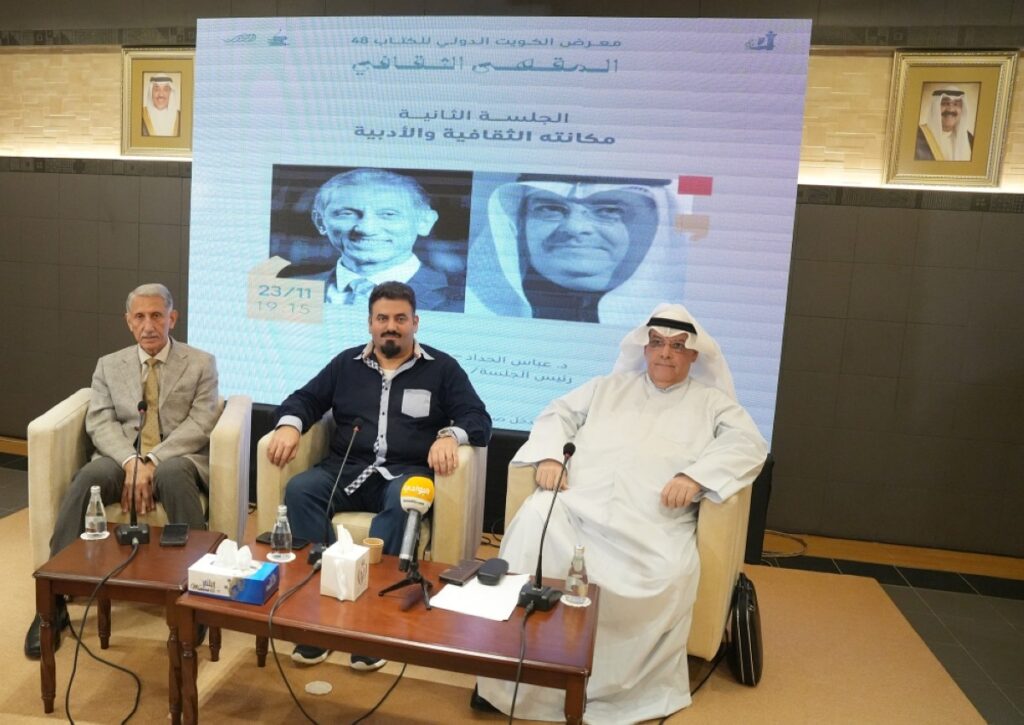KUWAIT: The 48th Kuwait International Book Fair commemorated the life and contributions of the late poet Ahmed Meshari Al-Adwani, a distinguished figure in Kuwaiti thought, culture, and literature, and the author of the national anthem’s lyrics. The tribute was held through a symposium titled “Ahmed Meshari Al-Adwani: Poet of the Nation and Icon of Arab Culture” on Sunday at the Cultural Café in Mishref International Fairgrounds, attended by scholars, specialists, and cultural enthusiasts.
The symposium, which continues tomorrow, began with the screening of a documentary produced by the National Council for Culture, Arts and Letters, highlighting Al-Adwani’s legacy. Poet Dr Khalifa Al-Waqyan described him as “a symbol of culture in the Arab world.” The film detailed Al-Adwani’s role in founding the Kuwaiti Writers Association and Al-Bayan magazine, as well as establishing cultural initiatives such as World of Thought magazine, the World of Knowledge series, the World Theater series, and the Higher Institute of Musical Arts. His most celebrated contribution, the lyrics of Kuwait’s national anthem, continues to inspire patriotism among Kuwaitis.
Mu’ad Ahmed Al-Adwani, the poet’s son, described his father as quiet, thoughtful, and deeply committed to issues concerning Arab children, education, poetry, and family. In the first session, moderated by Dr Mohammed Al-Baghili, Dr Ali Al-Jaafar, Professor of Children’s Literature and Arabic Language Curriculum at Kuwait University, and Dr Abdullah Al-Jasmi, Professor of Philosophy at the same university, explored Al-Adwani’s upbringing, intellectual development, and cultural impact.
Dr Al-Jaafar noted that honoring Al-Adwani pays tribute to an entire generation that laid the foundations of modern Kuwaiti culture. He recalled his first encounter with the poet in 1984 and described six years of weekly meetings as formative, blending poetry, wisdom, and humanity. “For Al-Adwani, poetry was a vision of life, and books were windows to understanding humanity,” he said, emphasizing the poet’s capacity to combine authenticity with innovation. Dr Al-Jasmi highlighted Al-Adwani’s influence on Kuwait’s cultural, educational, and humanitarian development, describing him as a pioneering enlightenment poet whose contributions extended to Arab cultural circles.
The second session, moderated by Dr Mohammed bin Nasser, featured Dr Abbas Al-Haddad, Professor of Modern Literary Criticism, and writer Talib Al-Rifai, discussing “The Cultural and Literary Stature of Ahmed Al-Adwani.” Dr Al-Haddad traced Al-Adwani’s early cultural exposure, including his education at Al-Azhar University in Cairo as part of Kuwait’s first scholarship program in 1939, and his pivotal role in modern Kuwaiti cultural development, particularly through his leadership at the National Council for Culture, Arts and Letters. Al-Rifai highlighted Al-Adwani’s lifelong partnership with Abdulaziz Hussein and their joint cultural projects, including the Cairo-based magazine Al-Ba’tha. He emphasized Al-Adwani’s dedication to Kuwait’s cultural renaissance following the nation’s first oil exports in 1946, noting his humility, devotion, and preference for serving the nation over seeking the limelight.
Al-Rifai also discussed Al-Adwani’s poetic legacy, including his only collection published during his lifetime, Wings of the Storm, with subsequent works Oshal and Images and Reflections released posthumously. He praised the poet’s humanistic vision, spanning local, Arab, and global contexts, and his dedication to intellectual and cultural development through the National Council’s publications. The symposium will continue tomorrow with sessions featuring Dr Khaled Ramadan, Dr Khaled Al-Qallaf, Dr Mohammed Al-Dihan, Dr Saud Al-Harbi and writers Hamza Al-Olayan and Talal Al-Rumaidhi. — KUNA

